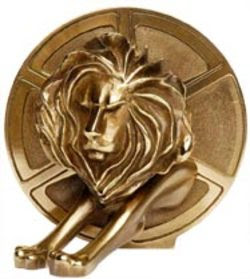I forgot to tell you that Idealog won the Qantas Media Award for feature website of the year. Art columnist Hamish Coney also picked up an award for his columns. A nice accolade for the had work the team at the magazine put in. A nice addition to the MPA award for Business magazine of the year.
Aren't blogs a wonderful place to get corny headlines out of your system? Actually the Qantas awards even had a category for best corny headline - though it wasn't called that.
 I couldn't understand the logic of the awards. Some received dinky little scolls with a cheap peice of metalic ribbon. Others got truly ugly silver salvers. It was a mess. At least the advertising industry has always understood the importance of trophies that look like tributes to a Roman general who has just taken half of Europe. Ok, hperbole, but you get the point. Even a simple pencil from D&AD, One Show or AWARD has heft. Is there a designer out there who canhelp these people out. How about the world's first gong with a light inside (media should illuminate).
I couldn't understand the logic of the awards. Some received dinky little scolls with a cheap peice of metalic ribbon. Others got truly ugly silver salvers. It was a mess. At least the advertising industry has always understood the importance of trophies that look like tributes to a Roman general who has just taken half of Europe. Ok, hperbole, but you get the point. Even a simple pencil from D&AD, One Show or AWARD has heft. Is there a designer out there who canhelp these people out. How about the world's first gong with a light inside (media should illuminate).
Aren't blogs a wonderful place to get corny headlines out of your system? Actually the Qantas awards even had a category for best corny headline - though it wasn't called that.
 I couldn't understand the logic of the awards. Some received dinky little scolls with a cheap peice of metalic ribbon. Others got truly ugly silver salvers. It was a mess. At least the advertising industry has always understood the importance of trophies that look like tributes to a Roman general who has just taken half of Europe. Ok, hperbole, but you get the point. Even a simple pencil from D&AD, One Show or AWARD has heft. Is there a designer out there who canhelp these people out. How about the world's first gong with a light inside (media should illuminate).
I couldn't understand the logic of the awards. Some received dinky little scolls with a cheap peice of metalic ribbon. Others got truly ugly silver salvers. It was a mess. At least the advertising industry has always understood the importance of trophies that look like tributes to a Roman general who has just taken half of Europe. Ok, hperbole, but you get the point. Even a simple pencil from D&AD, One Show or AWARD has heft. Is there a designer out there who canhelp these people out. How about the world's first gong with a light inside (media should illuminate).
Comments
Post a Comment